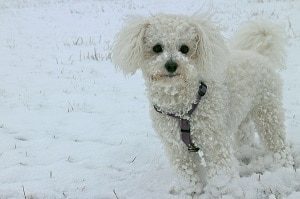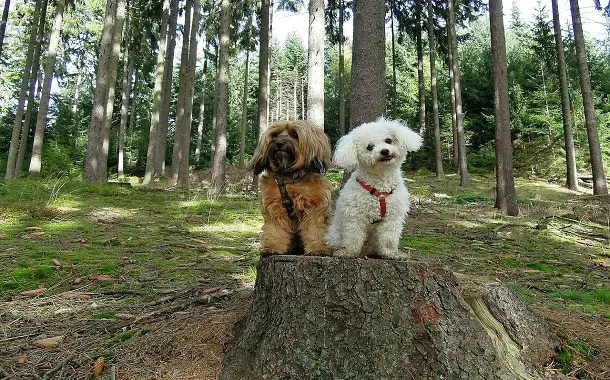How Much Does a Bichon Frise Cost?
Last Updated on December 27, 2023
Written by CPA Alec Pow | Content Reviewed by ![]() CFA Alexander Popinker
CFA Alexander Popinker
Many families are drawn to the Bichon Frise breed for their charming and affectionate personalities combined with their adorable teddy bear appearance. However, while they make delightful companions, Bichon Frises do not come cheap.
If you’re wondering “How much does a Bichon Frise cost?”, this complete guide breaks down their purchase price, lifetime expenses, cost considerations, and tips for keeping your budget under control when bringing one of these curly-haired dogs home.
How Much Does a Bichon Frise Cost?
The upfront cost to purchase a Bichon Frise puppy ranges between $50 and $300 in adoption centers and $1,000 to $2,500 at breeders.
Tryfi states that the average price of a Bichon Frise puppy from a reputable breeder typically ranges from $500 to $2,500 or more, depending on various factors such as age, appearance, health documents, breeder’s accreditation, size, gender, training, and more.
Spot Pet Insurance mentions that the average cost of a Bichon Frise could be around $1,200-$2,000, but this price can be higher and touch around $3,500 depending on the breeder.
Dog Breeds List states that the average price of a Bichon Frise puppy from a reputable breeder is between $1,000 and $2,000, while a top-quality Bichon Frise puppy can cost as high as $3,500 and upward.
Adopt a Pet reports that the cost to adopt a Bichon Frise is around $300 in order to cover the expenses of caring for the dog before adoption.
Purchasing from a breeder generally costs more since they specially breed purebred dogs with reputable lineages. Adoption centers and rescues offer major savings but may lack background on a puppy’s health or genetic history.
No matter where you get your furry friend from, owning a Bichon Frise also means additional costs that can affect the purchase price:
- Prestigious lineage with champion bloodlines, AKC registration, and pedigree papers – raises value
- Exceptional conformation and health – higher price tag
- Investment in careful, quality matings – increases worth
- Frequent professional grooming – boosts the cost
- Lack of coat maintenance – lowers cost
As you budget for a new Bichon puppy, keep these pricing factors in mind on top of the base purchase cost.
Additional Bichon Frise Costs
While the initial cost of a Bichon Frise seems steep for some, it is only the beginning of this breed’s expenses. Caring for them properly and keeping them healthy involves significant annual costs including:
- High-quality dog food: $300 – $500
- Vet visits/checkups: $600 – $900
- Vaccinations: $200+
- Spay/neuter: $200 – $300
- Pet insurance: $40 – $120 per month
- Grooming: a few hundred dollars+
- Training: hundreds for group to over $1,000 for private
You might also like our articles about the cost of breeds like the Maltipoo, the Morkie, or the Poodle.
Medical care is especially expensive for Bichons as they are prone to conditions like cataracts, hip dysplasia, and dental disease. Proper prevention and treatment are very much essential. Between food, vet care, grooming, insurance, and more, expect to spend a few thousand dollars yearly.
How Do Different Factors Influence Bichon Frise Prices?
A wide range of criteria accounts for the variability in how much Bichon Frises cost. Some elements that affect their price include:
Breed Popularity and Availability – As demand grows for these cute pups, limited breeding makes findable puppies more valuable. Shelters rarely have Bichons as people snap them up quickly. Their rarity drives costs up.
Purchase Source Reputation and Reliability – Disreputable sellers offer lower prices, but the health and temperament of these dogs are questionable. Reputable sources with safe breeding practices and screening charge more for healthy, socialized pups.
Coat Maintenance Needs – Frequent grooming is essential for Bichons, and pricing depends partially on how a puppy has been groomed so far. Show-quality grooming is costly and raises value, while poor maintenance lowers it.
Bloodline and Conformation – Dogs with champion lineages or optimal body structure and health cost more due to high breeding investment and the likelihood that the puppy inherits the more desired genetic traits.
Individual Needs – Age, medical needs, behavioral issues, or physical limitations all make a Bichon less adoptable, lowering costs. But some seek these small dogs, especially for savings and to improve their lives.
Medical Expenses – Veterinary care is essential for any dog. Initial vaccinations will cost about $200. Additional non-required vaccines may be $150 more. Yearly vet visits for checkups average $600-$900 depending on how often you go. Spaying or neutering costs $200-$300 but can improve your dog’s health and behavior.
Bichon Frises are prone to certain health problems. Hereditary cataracts may eventually cost $3,000 to treat. Hip dysplasia treatment ranges from $2,000-$2,500. Dental problems throughout their life may tally up to $1,000. Having pet insurance can help manage unexpected medical costs.
Food and Supplies – Expect to spend $300-$500 yearly on high-quality food for your Bichon Frise’s size and activity level. Follow your vet’s advice for the best diet. Additional supplies like treats and toys are optional. But be sure to give your dog plenty of love and attention and keep a strong grip on its dietary requirements!
Training and Grooming – Professional training can cost a few hundred to over $1,000 depending on the programs you choose. But many people successfully train Bichon Frises themselves at home. This breed does require regular professional grooming. Those ongoing costs should be factored into your budget as well.
Bringing Home Your Bichon Puppy
Bichon Frises make wonderful family pets. But they are rare and in demand, which raises their purchase price and lifetime care costs. Make sure your budget can comfortably fit this breed before getting your heart set on one of these fluffy companions.
How to Reduce Bichon Frise Ownership Costs
 While Bichon Frises demand a strong financial investment, smart planning, and research can help cut back your long-term expenses. Here are some great tips to cut the costs:
While Bichon Frises demand a strong financial investment, smart planning, and research can help cut back your long-term expenses. Here are some great tips to cut the costs:
Adopt Don’t Shop – Buying from breeders may promise purebred status, but adopting saves big on purchase price. Rescues also frequently cover initial vet fees.
Consider an Adult Bichon – Skipping the puppy stage means skipping the costs of supplies, housetraining, and spay/neuter procedures. Adult dogs still bond tightly with new families.
Learn DIY Grooming – Professional grooming runs hundreds per session. Learning to maintain their fur and nails yourself makes a massive dent.
Invest in Pet Insurance – One major surgery can nearly match the original cost of a Bichon. Having insurance will likely save thousands over their lifetime.
Create a Dog Budget – Track all projected and actual spending to optimize costs and savings. Budgeting ensures proper care without overspending.
Final Words on Bichon Frises
Owning any pup comes with high expenses. But understanding precisely how much Bichon Frises cost to acquire and care for allows you to prepare your finances. With realistic expectations of this breed’s needs and smart money management, you can welcome one of these pups without breaking the bank through their years of companionship.


Leave a Reply
Want to join the discussion?Feel free to contribute!